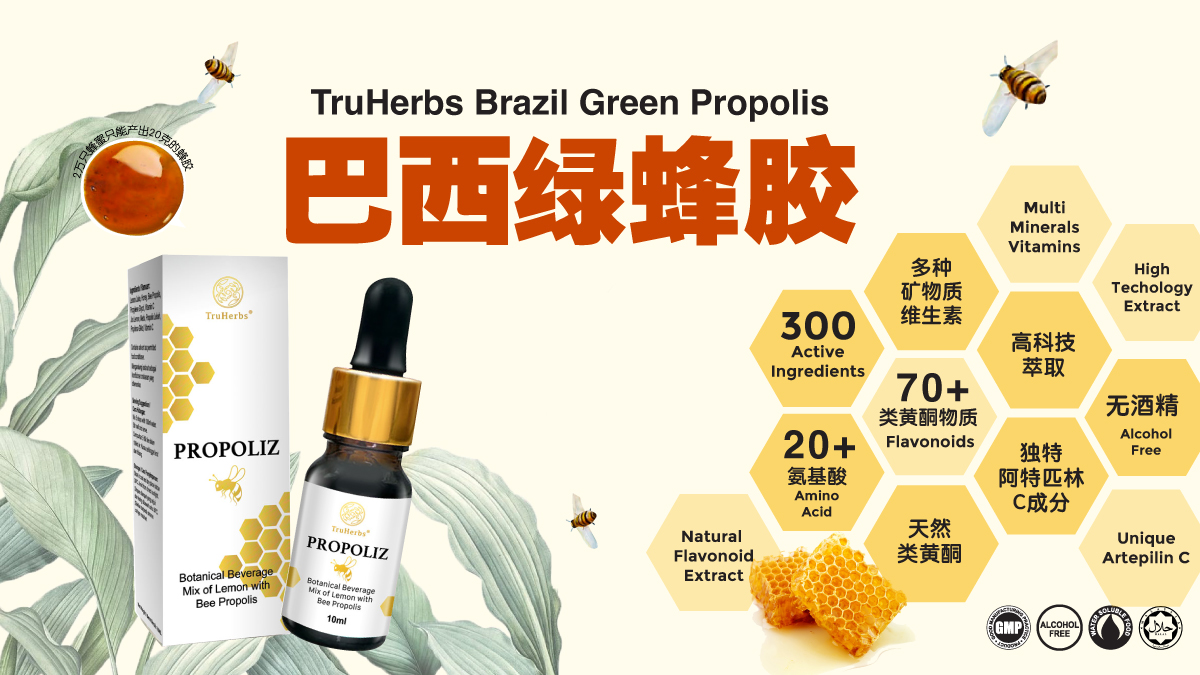Honey vs. Propolis: Do You Really Know the Difference?

Standing in front of a health product shelf, you’ve probably asked yourself: “Should I buy honey or propolis?” Though both come from bees, these two natural products serve very different purposes. Understanding their distinct origins, compositions, and health benefits is key to making the right choice for you and your family.
Whether you seek daily nourishment or immune support, this guide will help you make a smarter decision—starting with the basics and ending with a trusted product recommendation: TruHerbs Brazilian Green Propolis.
Origins and Composition: What Sets Honey and Propolis Apart?
Honey is created when bees collect flower nectar and convert it into a sweet, golden liquid rich in glucose and fructose. It also contains small amounts of vitamins, enzymes, and minerals.
Propolis, by contrast, is a resinous substance made by bees from tree sap, mixed with wax and bee enzymes. It contains flavonoids, organic acids, and powerful bioactive compounds.
| Aspect | Honey | Propolis |
|---|---|---|
| Source | Flower nectar | Tree resin + bee wax + enzymes |
| Composition | Natural sugars, vitamins, enzymes | Flavonoids, phenolic acids, terpenes |
| Nature | A food product | A natural medicinal extract |
| Function Focus. | Nourishment, hydration, mild relief. | Immune defense, anti-inflammatory, repair |
Function Comparison: Complementary, Not Interchangeable
Health Benefits of Honey
- Digestive Aid: Promotes bowel movements and relieves constipation
- Skin Nourishment: Keeps skin hydrated and radiant
- Sore Throat Relief: Soothes irritation with warm honey lemon water
Health Benefits of Propolis
- Anti-inflammatory & Antibacterial: Effective for gum issues, throat inflammation, and minor wounds
- Immune Booster: Stimulates immune response with high flavonoid content
- Oral & Respiratory Support: Helps with ulcers, gingivitis, and persistent colds
Are their effects the same? Not at all—honey is more nourishing, while propolis is more defensive and reparative. How Does Propolis Boost Immunity? Who Should Take It?
Who Should Choose Honey vs. Propolis?
Honey is ideal for:
- Daily wellness routines
- Children, seniors, and pregnant women
- Mild digestive or skin hydration needs
Propolis is best for:
- Individuals with frequent colds or weak immunity
- People with oral issues like ulcers or sore throats
- Those looking to strengthen immune defenses naturally
Special Note: Diabetics or people with sugar sensitivity should limit honey intake due to its high sugar content. Propolis is generally safe but should be introduced in small amounts for allergy-prone individuals.
Best Ways to Use Honey and Propolis Together
- Morning Honey Water: Start your day with a glass of warm water and honey to stimulate digestion and energy.
- Targeted Propolis Use: Use propolis drops or sprays directly for oral or throat discomfort.
- Cycle & Combine: Use honey for daily support and propolis for targeted repair when immunity dips.
- Prioritize Quality: Choose products like TruHerbs Brazilian Green Propolis, known for its high flavonoid content and purity.

Why Choose TruHerbs Brazilian Green Propolis?
TruHerbs sources its propolis from Brazil—recognized globally for its potent green propolis. Every batch is crafted with care to offer unmatched protection and healing.
- Immune Enhancement: High flavonoid levels stimulate white blood cells and immunity
- Natural Antimicrobial Action: Helps reduce flu and cold symptoms
- Powerful Antioxidant: Combats free radicals, delays signs of aging
- Safe and Natural: No synthetic additives, suitable for regular use
Frequently Asked Questions (FAQs)
Can honey and propolis be taken together?
Yes, they can complement each other. Honey offers daily nourishment, while propolis targets inflammation and immunity. For best results, alternate usage or take honey in the morning and propolis later in the day.
Which is better for boosting immunity?
Propolis is more effective for direct immune enhancement thanks to its high flavonoid content. Honey supports general wellness but doesn’t stimulate the immune system as strongly.
Is it safe to consume honey every day?
Absolutely, for most people. 1–2 teaspoons daily is considered safe and beneficial. However, individuals with diabetes or obesity should monitor sugar intake and consult a doctor.
Is propolis safe for children?
Children over 2 can usually take propolis in low doses. Always start small and monitor for allergic reactions. For young children or those with allergies, consult a pediatrician first.
How to identify high-quality honey or propolis?
Look for single-origin, unprocessed honey with no added sugars. For propolis, verify the source (like Brazil), ensure it contains flavonoid concentrations, and check for third-party testing.
Final Thoughts
Honey and propolis are not rivals—they're allies. Use honey to nourish, soothe, and hydrate, and use propolis to protect, strengthen, and heal.
If you're looking for a reliable natural immune protector, TruHerbs Brazilian Green Propolis is your answer. Potent, pure, and trusted by thousands—it’s nature’s defense in a bottle.
Click here to learn more and purchase your bottle of TruHerbs Brazilian Green Propolis today.

 Bahasa melayu
Bahasa melayu 中文
中文
























